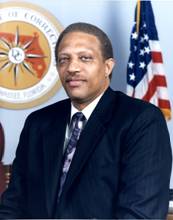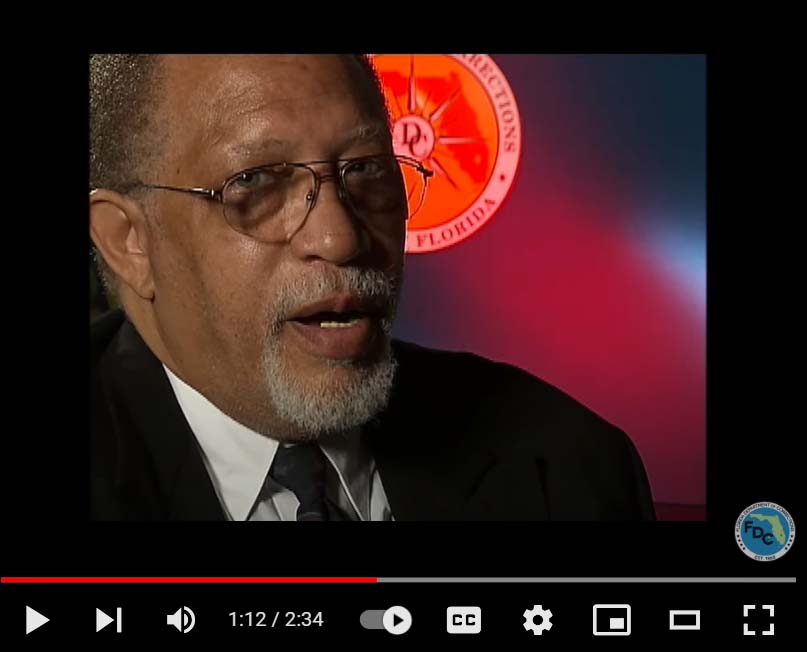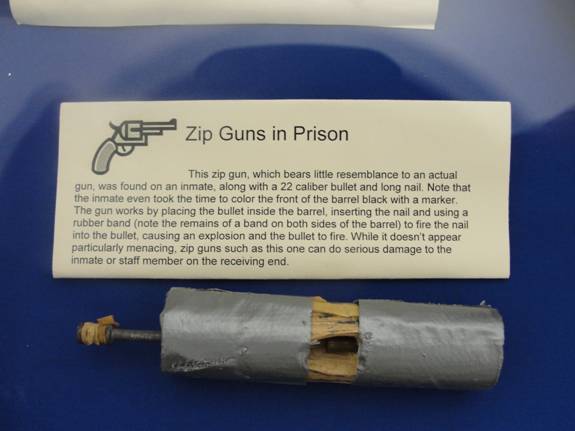2009
OFFENDER POPULATION JUNE 30, 2009
INMATES: 100,894
SUPERVISED: 157,222
INMATES: 100,894
SUPERVISED: 157,222
The Florida Department of Corrections, which houses more than 101,000 inmates and supervises more than 156,000 active offenders in our communities, accomplished a number of goals in 2009, from zero perimeter escapes to opening two new re-entry facilities to tracking down 12,000 absconders and arresting 885 probation violators during sweeps of their homes.
Security - Since the Department of Corrections’ (FDC’s) main mission is public safety, it’s worth noting that once again, there were no escapes from the secure perimeter of any FDC institutions this year. That success can be attributed to a combination of training and technology, and to our commitment to learning from our mistakes. Keeping our institutions running smoothly and safely, and ensuring public safety inside and outside the fences remains our highest priority.
Community Corrections - In Community Corrections, our absconder unit and key field staff helped track down more than 12,000 absconders from supervision in FY0809, using their rapport with various local law enforcement agencies and new technology to combine forces to apprehend these individuals.
Also this year, more offenders on supervision are successfully completing probation.
Community Corrections was also awarded a $3,448,782 grant from the U.S. Department of Justice that is being used to reduce caseloads in six circuits. The Competitive Byrne Grant funding is being used to train and hire 30 new probation officers in Alachua, Bay, Lee, Lake, Polk and Pinellas counties over the next two years.
Our probation officers held a number of job resource fairs throughout the year designed to assist offenders in finding jobs and housing, and to connect them to local resources for health care, education, etc.
Probation officers also partner with law enforcement statewide on 256 sweeps of offenders’ homes, arresting 885 violators during these sweeps, and seizing illegal weapons and drugs, and pornography from sex offenders.
Health Services - In Health Services, we will miss the leadership of Dr. Sandeep Rahangdale, who will be returning to the private sector in January, but he leaves behind a very talented team who will continue to build upon Health Service successes and initiatives. Their efforts have saved the Department millions of dollars, even as waiting times were reduced and clinical care improved. It is no wonder that Health Services staff were among the 15 individuals and teams from Corrections to earn Davis Productivity Awards this year.
Special Olympics - Speaking of staff, our agency was once again the recipient of the “Cal Henderson Award” in 2009 for being the top fundraising statewide agency for the Law Enforcement Torch Run, raising close to $130,000 this year for Special Olympics.
Food Services - 2009 was the year that we re-assumed full control of our Food Service Operations. Today, we spend less than $3 per day (not per meal, per DAY) to feed the more than 101,000 inmates in our prison system, a remarkable feat. Our inmates continue to grow close to three million pounds of crops every year at 30 different farms and gardens around the state. These cantaloupe, broccoli, cabbage, watermelon and more are used to supplement inmate meals and help us keep costs down. In March this year, the Department asked our new Food Service provider, U.S. Foodservice, to evaluate a Florida peanut butter company based in Jacksonville as a possible supplier for the tons of peanut butter and jelly eaten by our inmates annually. As a result, the Department is saving about $234,000 annually on the cost of peanut butter and jelly, and 19 Floridians and employees of Sunshine Peanut Company who would have lost their jobs without this contract remain employed.
Drug Interdiction, Tracking and Shelter Dogs - We added a second cell phone-sniffing dog, Uno, to our Inspector General’s Drug Interdiction Unit this year, which once again took top honors at the Southern Hills Kennels Drug/Bomb Detection Seminar held in November.
Our institutional tracking dog teams also continue to shine, most recently at DeSoto Correctional Institution (CI), where one of their Tracking Teams saved a lost hunter in the Everglades in November.
We now have five inmate dog-training programs around the state at Taylor, Wakulla, Gulf, Gainesville CIs, and Sago Palm Work Camp (trained for the disabled), and this year we began to feature the dogs on our public website when they graduate from training and are available for adoption.
Re-Entry - Last, and certainly not least, are the accomplishments in our Re-Entry efforts. We opened Demilly CI in March and Baker CI in August as our initial re-entry centers, designed to prepare inmates for transition back into their communities by emphasizing education, substance abuse treatment and re-entry skills.
On the education front, the number of inmates earning GED certificates jumped 49% over the last two years, from 1,953 GED certificates earned in fiscal year 2008-09, compared to 1,313 in FY 2006-07, an increase of 640 more certificates earned. And in October we learned that we, the city of Jacksonville and the Jacksonville Sheriff’s Office received $750,000 through a grant from the Department of Justice's Federal Second Chance Act. The funds are being used to assist former felony offenders as part of our statewide re-entry initiative in the Jacksonville area. We also introduced our fourth Faith and Character-based institution in 2009, Glades C.I.
FLORIDA'S PRISON POPULATION REACHES SIX DIGITS
At 8 a.m. on December 18, 2009, Florida became the third state to have more than 100,000 inmates in its prison system. California and Texas are the only other states that incarcerate more than 100,000 state prison inmates.
Suwannee Correctional Institution (Live Oak, FL) opens.
2010
OFFENDER POPULATION JUNE 30, 2010
INMATES: 102,232
SUPERVISED: 152,928
INMATES: 102,232
SUPERVISED: 152,928
INMATE WHO MURDERED CORRECTIONAL OFFICER SENTENCED TO DEATH
Florida Inmate Enoch Hall is sentenced to death on January 15, 2010 for the murder of Tomoka Correctional Institution Correctional Officer Donna Fitzgerald.
Statement from Secretary McNeil:
“Enoch Hall brutally murdered Tomoka CI Correctional Officer Donna Fitzgerald in June 2008. The sentence today is appropriate,” said Department of Corrections Secretary Walt McNeil. “For some people, the sentencing of Enoch Hall may signify the end of this case, but for us, Officer Fitzgerald’s murder will never be far from our minds. We have learned from this tragedy, but we can never fully remove the danger our staff faces daily. Being a Correctional Officer is truly a Career of Courage.”
FORMER DEPARTMENT OF CORRECTIONS SECRETARY HARRY K. SINGLETARY, JR. DIES AT THE AGE OF 63. HE SERVED AS SECRETARY FROM 1991-1999.
 Harry K. Singletary, Jr., was appointed the Secretary of the Florida Department of Corrections by Governor Lawton Chiles from 1991-1999, and was the first African-American to serve in that capacity. He is fondly remembered by Corrections employees for his sense of humor and “walk around” style of management; and for the many innovative ideas and programs he implemented during his tenure as Secretary. Harry died on Friday, January 29, 2010 from complications of Hodgkins lymphoma at the age of 63.
Harry K. Singletary, Jr., was appointed the Secretary of the Florida Department of Corrections by Governor Lawton Chiles from 1991-1999, and was the first African-American to serve in that capacity. He is fondly remembered by Corrections employees for his sense of humor and “walk around” style of management; and for the many innovative ideas and programs he implemented during his tenure as Secretary. Harry died on Friday, January 29, 2010 from complications of Hodgkins lymphoma at the age of 63.
Born the third of four children to a Pinellas County orange-grove worker and a housekeeper, Harry was a star center on Florida Presbyterian (now Eckerd) College’s basketball team and one of the few African Americans in the school at that time. He earned a master’s degree in social services at the University of Chicago and worked in the Illinois corrections system for 11 years before returning to his Florida roots in 1979. After eight years as Assistant Secretary of Operations in the Florida Department of Corrections, he was appointed Secretary in 1991.
During his administration, he focused his energies on prison building, increased staff training, improving technology, Total Quality Management, diversifying the workforce and resolving long-standing litigation against the Department. After leaving the Department, he worked for a number of years with troubled students. Right up to the end, he was mentoring young men from Timberlane Church of Christ, where he was an active member.
Noting that a prison cell “is not a public zoo,” Singletary terminated tours of death row, and instead made video available for those who want to see inside a prison. Singletary was also a strong proponent of employees furthering their education and professional development, and he implemented long-term strategic planning. He also had many employees become Certified Public Managers. Perhaps his most important career-related legacy was building enough prisons so that Control Release, the automatic release of inmates due to prison overcrowding, was ended. He also felt that ending early release for inmates restored integrity to the judicial system.
Harry was famous for his instructional catch-phrases: “Don’t bring me a problem without a solution,” “Attitude determines Altitude,” and “You’d better write your plans in pencil, because only God can write in pen.” Harry said the upside of the Costello lawsuit was that FDC was given money to address legitimate issues that needed to be corrected, noting that “People are sent to prison as punishment, not for punishment.” A devout Christian, Harry had an extensive email list of friends with whom he shared his thoughts and beliefs often, and friends from all over who remember his kindness and generosity of spirit.
His survivors include his wife, Vivian; and his wife, Kim, who predeceased him, and their sons Jon and Harry Kthaw III, and daughter Taiwo McRae.
In Harry K. Singletary, Jr.’s memory, Corrections employees participated in fundraisers and “Light the Night” walks statewide for the Leukemia and Lymphoma Society in 2010, raising a whopping $82,543.62 to combat the disease and honor our former Secretary
TALLAHASSEE DEMOCRAT
2 FEBRUARY 2010
Harry Singletary, 63, was first black to lead DOC
By Gerald Ensley
Democrat Senior Writer
Harry Singletary believed all human beings deserved a second chance.
That might not be the attitude most associate with the head of a state prison system. But it was one of many innovations Singletary brought to his eight years as Florida's Secretary of the Department of Corrections.
Singletary died Friday, January 29, from complications of Hodgkins lymphoma. He was 63.
Singletary was the first black person to head the Department of Corrections when he was appointed in 1991 by Gov. Lawton Chiles. Singletary, who spent 30 years as an administrator in the corrections systems of Florida and Illinois, was replaced in 1999 by Gov. Jeb Bush.
(Click Here to read about former Secretary Singletary's experience meeting with Governor Chiles prior to his appointment; convincing the Governor that he was the right man for the job.)
"Harry was a real trailblazer," said David Murrell, executive director of the Florida Police Benevolent Association. "Instead of locking people up and throwing away the key, he believed you had to give people a second chance.
"A lot of what he advocated has come to pass (in current corrections philosophy). He was probably ahead of his time."
Under Singletary, the DOC implemented 72 cost-saving measures, added 30,000 beds, increased time served from 33 percent to 75 percent of a sentence, increased collection of victim restitution and court fees and reduced escapes to an all-time low.
Singletary instituted new training programs for corrections officers and advocated for rehabilitation programs and post-prison jobs for inmates.
"Harry took over a deeply imbedded good ol' boy system and really changed things," said state Sen. Al Lawson, D-Tallahassee. "Many don't understand the legacy of Harry, but some of us did."
Current DOC Secretary Walt McNeil said Singletary is "fondly remembered (in DOC) as a 'walkaround' Secretary" who showed up in employees' offices, asked about department problems — and expected them to offer solutions.
"He was a down-home, folksy guy, who said 'If (the secretary) does the dadgum right thing, then (employees) will do the dadgum right thing,' " McNeil said. "He did not mix his words. He said what was on his mind."
After leaving DOC, Singletary spent nine years as an administrator with Leon County's Second- Chance School for drop-outs and expelled students.
Singletary was the third of four children born to a Pinellas County orange-grove worker and his wife, a maid.
Singletary was a star basketball player who spent one year at Kentucky State College, then transferred to Florida Presbyterian College (now Eckerd College) in 1965. The burly, 6-foot-3 Singletary set numerous school scoring and rebounding records, was chosen a small college All- American and was one of the first blacks to play for a previously all-white school in the South.
He earned a master's degree in social services at the University of Chicago and spent 11 years with the Illinois corrections system before joining Florida's DOC in 1979. He was DOC assistant secretary of operations for eight years before Chiles elevated him to the top spot.
He is survived by his wife of five years, Vivian Jenkins, and three adult children.
 We once asked Secretary Singletary what he saw as his biggest strengths, and his answer helps illustrate why he is remembered so fondly.
Click here to hear Secretary Singletary's answer.
We once asked Secretary Singletary what he saw as his biggest strengths, and his answer helps illustrate why he is remembered so fondly.
Click here to hear Secretary Singletary's answer.
FLORIDA CORRECTIONS EXHIBITS FEATURED AT TWO MUSEUMS
An exhibit created by Florida Department of Corrections employees opens at Florida’s Historic Capitol, featuring displays about former Florida inmate Donn Pearce, who wrote “Cool Hand Luke,” prison “shanks” or homemade weapons and the danger they pose to inmates and staff, and the utility of the Department’s prison dog tracking program. Also featured are displays with items for sale in inmate canteens, toys inmates made for needy children, the role of tobacco, and the Department’s Cold Case Card initiatives, where inmates are given free decks of cards with cold case information on each one, along with a tip line to call. Also on display are photographs and a speech given by former Governor Leroy Collins at the dedication of Florida State Prison in 1960. Parts of the Department’s timeline that you are currently reading are also on display.
“We’re hoping to educate the public about the different facets of our prison system, because there are a lot of misconceptions,” said Department of Corrections Secretary Walt McNeil. “By displaying the weapons inmates make out of items as common as an ink pen, for example, you can get a sense of some of the dangers our staff face daily.”
A tumultuous week at Florida State Prison in 1980 is also featured, during which Correctional Officer Richard J. Burke was murdered by death row inmate Thomas Knight and another officer was stabbed by a second death row inmate. Knight remains on death row today.
The cases were created by FDC employees and were displayed in the hallways in the Department’s Tallahassee Central Office location over the last few years. This exhibit marks the first time these items have been displayed to the public, and it will be open through April 2, 2010.
“Everybody who has seen the exhibit has just loved it,” said Andy Edel, Exhibit Project Manager. “We’ve had a few people come in and ask specifically to see it.” He noted that the shanks display, Cold Case Cards and toys made by inmates are especially popular. “We’ve had a lot of compliments about the skill level of the inmates who made the toys.”
In February, another exhibit “Crime in Miami” opened in February at the Historical Museum of Southern Florida in Miami, featuring some items from the Florida Department of Corrections.


2010 IN REVIEW BY SECRETARY WALTER MCNEIL
As we begin a new year, I want to tell you that I'm proud of all we've accomplished. We've achieved much over the past few years while facing cuts to our budget and staff. Despite challenges to everyone in our Department from line staff to our leadership, we pulled together to make a difference and work toward our goal to be the best corrections department in the world. I'd like to look back at some of the accomplishments we've achieved working together as a team.
Our greatest accomplishment has been protecting the public. Keeping Florida citizens safe is the reason our agency exists and it will always be our top priority.
To that end, none of Florida's 102,000 inmates has tunneled under or scaled the razor wire fences of a prison in years. Outside the fence, probation officers conducted nearly 300 probation sweeps of offender's houses this year, resulting in hundreds of arrests.
Knowing that 88% of the inmates in prison today will eventually be released into our communities, we are acutely aware of the importance of preparing them to be productive citizens upon release. We are working diligently to reduce our 33% recidivism rate, which is below the national average and is much lower than some states with large populations such as California, which has a 60.5% recidivism rate.
To combat recidivism, we have expanded the number of Faith and Character-Based Institutions, created specialty prisons that provide vocational, academic and substance abuse assistance to inmates near the end of their sentences, and tripled the number of inmates earning their GED's despite cuts to our education staff.
We all suffer when one of our own employees lets us down, but we've taken steps to better police ourselves. We have expanded the Inspector General's Office to increase the number of Drug Interdiction Units and Prison Inspectors and we have identified and trained new leaders by implementing statewide leadership training. This training emphasizes everything from ethics to emergency management, decision making and critical thinking.
I think it's important for the public to know that we are prudent stewards of their money and their trust. Being a public servant has never been a particularly enviable position, perhaps even less so these days, as our roles are often misunderstood. I am proud of our accomplishments and I'd like to remind you of some of the highlights.
In our communities, state inmates provided 6.6 million hours of inmate labor, saving Florida taxpayers an estimated $59 million last year alone. In addition, our Probation Administrators and prison wardens sit on Public Safety Coordinating Councils statewide, further demonstrating our commitment to the safety of our communities.
Our Office of Health Services saved millions on inmate healthcare through drug repackaging ($1.4 million), statutorily limiting hospital expenses ($24 million), partnering with the Department of Health on STD treatment ($4.9 million) and using generic psychotropic medications ($2.1 million) when appropriate.
We expanded our crop program (including hydroponics) and reduced the cost of inmate meals to $2.31 a day or 77 cents per meal. Inmates also harvested and consumed millions of pounds of produce that they grew themselves on prison grounds.
Our probation officers have reduced by 3,441 the number of probationer technical violations last year, leaving more prison beds available for violent offenders. They also increased restitution payments from probationers to victims, collecting more than $50 million in restitution, court fines and costs this year. On the streets, our probation officers worked closely with local law enforcement, conducting 295 sweeps of probationers' homes last year, resulting in 713 arrests of offenders breaking the law.
I hope you are as proud as I am of our many accomplishments this year. I want to thank each of you for your contributions to these accomplishments, and I encourage you to continue to work together as a team to protect the public, each other, and those in our charge.
Walt McNeil
Secretary
"We Never Walk Alone"
- 1821-1845
- 1868-1876
- 1877-1895
- 1900-1919
- 1921
- 1922-1924
- 1927
- 1928-1931
- 1932 | CHAPMAN
- 1933-1935
- 1936-1939
- 1940-1945
- 1946-1949
- 1950-1955
- 1956-1961
- 1962 | WAINWRIGHT
- 1963-1965
- 1966-1969
- 1970-1975
- 1976-1979
- 1980-1986
- 1987 | DUGGER
- 1988-1990
- 1991 | SINGLETARY
- 1992-1995
- 1996-1998
- 1999 | MOORE
- 2000-2002
- 2003 | CROSBY
- 2004-2005
- 2006 | MCDONOUGH
- 2007
- 2008 | MCNEIL
- 2009-2010
- 2011 | BUSS
- 2011 | TUCKER
- 2012 | CREWS
- 2013-2014
- 2014 | JONES
- 2015-2018
- 2019 | INCH
- 2020-2021
- 2021 | DIXON
- 2022-Today
- Population Summary Table

